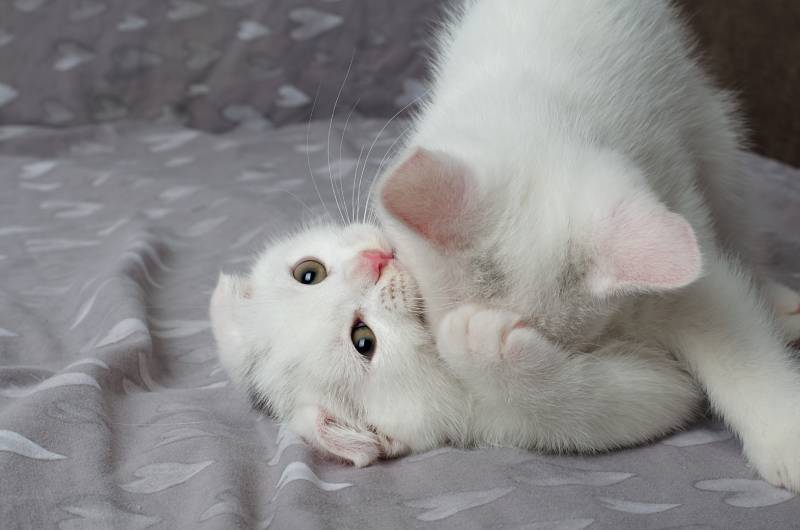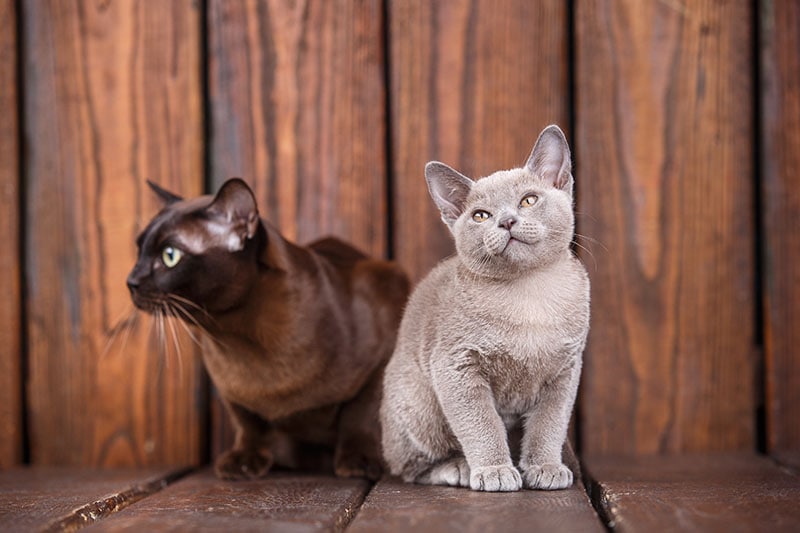
Seeing a mother cat get aggressive with her kittens can be surprising, but it’s not all that uncommon. Cats attacking their kittens can happen for various reasons; most are pretty normal and nothing to be concerned about as long as the kittens aren’t in any real danger, whereas others may involve a trip to the vet for a health checkup.
Let’s explore the possibilities.

The 7 Reasons Why Mother Cats Attack Their Older Kittens
1. The Kittens Are Grown Up
In nature, a mother cat’s role is not only to feed and protect her kittens but also to prepare them to branch out on their own. Kittens can reach sexual maturity as early as 4 months, and it may be at this point that a mother cat feels that her kittens are ready to face the world without her guidance. She may get hostile towards them to encourage them to “fly the nest.” This is how a cat shows her not-so-little-anymore ones that they can no longer rely on her.

2. She’s in Heat Again
Cats can go back into heat very quickly after having a litter. This can be in as little as 8 weeks after giving birth. If this happens, the queen may feel it is time to wean her litter in order to prepare for another pregnancy.
3. Redirected Aggression
If cats are frightened or aggressively aroused by something they’ve seen but that they’ve not been able to get to, they can lash out on whoever or whatever is closest to them. There can be a delay in the reaction, so a cat that passed by the window half an hour ago could be the cause of your mother cat lashing out at her approaching kitten.

4. Irritation or Illness
Imagine yourself in mama cat’s position for a moment—you’re trying to enjoy a well-deserved snooze, but your five or six young’uns are using you as a climbing frame and getting up to all kinds of mischief to get your attention. Make no mistake, when a mother cat is irritated with her kittens, she could well lash out (swiping, bopping, biting, etc.) to get them to back off and give her some peace.
When a mother cat isn’t feeling well because she’s sick or injured, it’s not unusual for her to behave more aggressively than usual with her kittens. When cats are poorly, they don’t want to interact—they want to be left in peace. Kittens won’t understand this and will want to play and snuggle with mom as usual, which could trigger her to lash out because she wants to be left alone. If a mother cat has mastitis (inflammation of the mammary gland/s) for example, it will be painful for her to feed the kittens, so she may be more aggressive than usual.
Signs of illness or pain in cats include isolating themselves, being lethargic, appetite changes, changes in bathroom habitats, sudden mood changes, poor coat condition, and poor coordination, but these are just a few examples. If you suspect that your cat is unwell in any way, please contact a vet.
5. Correcting Bad Behavior
One of the most important lessons a kitten learns from their mother is how to socialize and interact with other cats appropriately. If one of her kittens is behaving in a way that she doesn’t like, she will typically walk away to show the little one that she will not tolerate their foolishness.
If the kitten continues being naughty, she will proceed to vocal correction (hissing, growling, and/or meowing). If vocal correction doesn’t do the trick, she will use physical correction, which involves swiping at, bopping, or biting the offender. She doesn’t mean to hurt the kitten; she’s just trying to show what is and isn’t acceptable.

6. Territorial Behavior
Cats are territorial animals and territorial behavior can be seen between a mother cat and her kittens once they reach sexual maturity. Grown-up kittens can become a threat in terms of food and other resources, including space. This is a particular problem in smaller homes with multiple cats. If the kittens are trespassing in mom’s favorite snoozing spot, don’t be surprised if she takes a swing at them as a stark reminder that it’s her territory.
7. Play
It’s common for cats to play-bite and wrestle with their companions, but when it’s a big mama cat versus a kitten, it might look like an attack when it’s just play. Signs that mom is only playing include taking turns to wrestle, chase, and pounce, bouncy rather than rigid body language, a lack of vocalizations, and not getting those claws out.


Should I Stop a Mother Cat Attacking Her Older Kittens?
In most cases, no—just let her do her thing. She’s probably just putting the kittens in their place or teaching them how to interact appropriately, and these are important lessons for kittens to learn from their mothers. You should only intervene if it seems like the mother cat is really hurting her kitten or the attack seems especially vicious and prolonged.
Tips for Preventing Mother-Kitten Attacks
Though an occasional bite or swipe is normal, if your cat is attacking her kittens often, it might be time to reassess if her boundaries are being overstepped or her resources threatened a little too frequently. Here are some tips for keeping mama cat happy:

Conclusion
The majority of the time, mother cats show aggression towards their older kittens to teach them a lesson or due to territorial behavior, and it’s not abnormal in any way.
However, if this behavior is becoming frequent, it could be a signal that the mother cat is unwell, is too stressed, or that the kittens need to be weaned and removed from her territory. If you suspect your mother cat is unwell, please contact a vet for advice. If a cat becomes aggressive with her kittens (especially if they are under 8 weeks) it is a good idea not to breed from that cat again and to get her neutered as this behavior may well recur with future litters.
Featured Image Credit: Margarett24, Shutterstock

